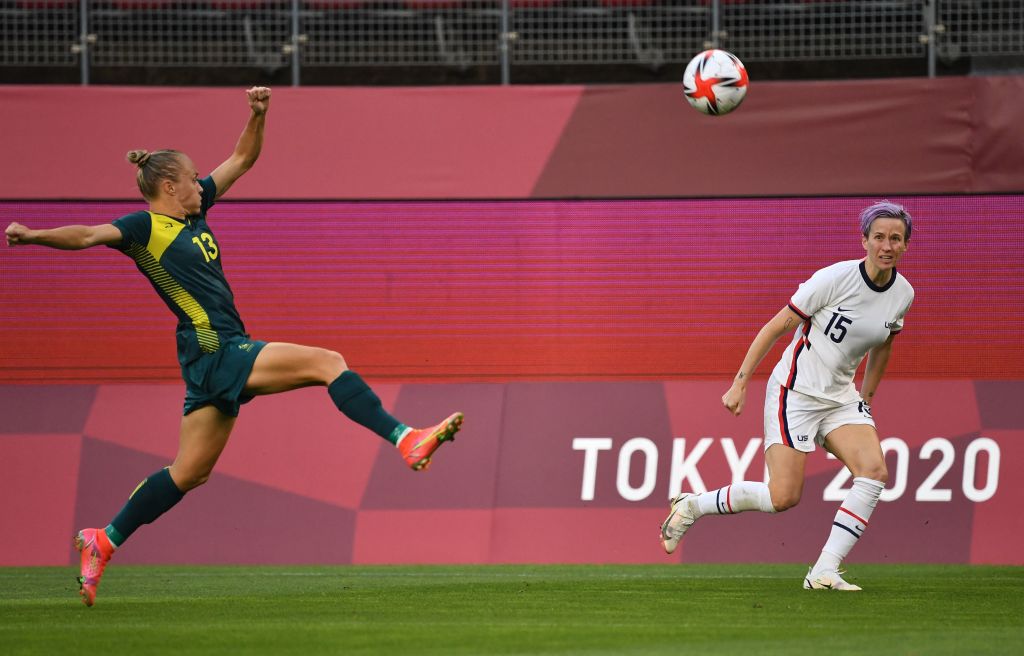After a goalless draw against world champions, the USA, Matildas' head coach Tony Gustavsson and defender Alanna Kennedy spoke with Tokyo 2020 media about the tactics and strategies employed within the game, along with the wait to find out if they've qualified for the Tokyo 2020 Olympic quarterfinals.
"From the first minute we communicated to the team that the US changed their defensive shape against us and went to a 4-4-2 and also chose to be more of a set structure and press less than I'm used to seeing them," Gustavsson said of if the US team played as he expected them to.
"They were a little bit more covering and protective with their defending and waited for those transition moments to try to kill us on the transitions, probably because they've seen that we've conceded a couple of goals in defending transition earlier in the tournament.
"What I'm pleased with from our standpoint is that it felt like we were in control in a lot of moments of the game, both with and without the ball.
"Going into this game, I was asked how are you going to approach the US game, and I said, we're going to be true to who we are and hopefully it's good enough.
"You saw a team today that pressed aggressively every time we could, but we were also good in our lower block when we needed and when you play the US, you need to be humble enough to understand that sometimes you need to sit in a low block as well."
Gustavsson went on to discuss the positive statistics that had come out of not only the game against the US, but the Matildas' performance across the tournament so far.
"Looking at some of the stats the analysts gave us, we had 600 passes versus 320, not the passes itself wins the game, but one thing that stands out for me and I think that's credit to the players here, for all three games so far, we have had very positive stats on tackles and duels won.

"We won 70% of the tackles tonight in the one-on-one duels and I think that was one of the key factors as to why we came up with a clean sheet. The individual defending was brilliant tonight."
The former USWNT assistant coach was also asked how much of an advantage he had, due to his previous role within the USWNT.
"I think every time you know a lot about an opponent, it helps you. We have a fantastic scouting team behind the scenes doing a lot of scouting for us, so I'd say we always go into a game with a lot of information.
"I give the players a lot of information to process, but they're phenomenal in terms of staying loyal to the game plan and obviously this time, it was unique that I'd been with the US team for so many years, and not just knowing the collective strategy of the team, but also the individual tendencies of a player, which helps in the scouting report so our players can be prepared with what to expect, so I definitely think it helped."
When asked about the late inclusion of Mary Fowler for Caitlin Foord, Gustavsson talked about adaptability within the squad.
"Caitlin felt something in her leg during warm-up and our sports medicine team decided it was a risk for her to play, we wanted to play it safe, but I'll get more of an update tonight," he explained of Foord's exclusion.
"But I'm going to use a quote that I've used for the team early on and quote Charles Darwin. He would say, 'It's not the strongest that survives, nor the most intelligent that survives, it's the one that is most adaptable to change,' and that's something we've talked about for months now, whether that's weather circumstances, COVID protocol, cancelled training or a player getting injured, there can be a lot of different circumstances.

"This team has shown tremendous adaptability, no matter who's on the park, it's very clear every player is ready to execute the game plan.
"Mary being a young player, I'm impressed by how she handled the potential stress that can come from being a young player in a situation like that. But she was cool, she was ready with a smile on her face.
"Five minutes before we went up to the locker room, she gets the message and said, 'Okay, I'll do it,' and for a young player to do that shows that she has mental strength."
With the Matildas' progression in the Olympic tournament reliant on the outcomes of upcoming games tonight, Kennedy was asked if the team would be watching.
"We've done what we need to and we'll see what happens, for us as a team, we're just ready to recover," she said.
"Our plan is to get on the bus back to our hotel and prepare as best as we can for our next game."
Gustavsson added that the coaching staff would stay back to watch the matches, in case the Matildas are to face one of the sides in the quarterfinal.
